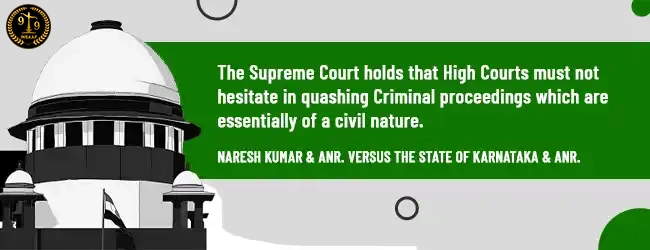2024-Mar-15

The Supreme Court has allowed a Criminal Appeal against the order of the Karnataka High Court dismissing the quashing petition filed under section 482 of the Criminal Procedure Code. The appellants challenged the order of the Karnataka High Court by which their petition under Section 482 of Criminal Procedure Code for quashing the FIR had been dismissed. The case of the appellants before the High Court of Karnataka was that the FIR which was instituted by the complainant i.e. Respondent No. 2 was primarily a civil dispute and has no criminal element and the entire criminal proceedings initiated against the appellants is nothing but an abuse of the process and consequently, they had invoked the extraordinary powers of the High Court under Section 482 of the Criminal Procedure Code.
The two appellants before the Supreme Court were the Assistant Manager (Marketing) and the Managing Director of a company, which is a manufacturer of bicycles. Respondent No.2 was given a contract, as it had been stated before this Court, for the assembly of bicycles, their transport and their delivery, at the rate of Rs.122/- for each bicycle, and since they had assembled 83,267 bicycles, they raised invoices amounting to Rs. 1,01,58,574/- and were liable to be paid the same.
However, Respondent No.2 contended that instead, a payment of only Rs.35,37,390/- was given by the Appellants. Hence, it was a case of criminal breach of trust and cheating and the First Information Report No. 113 of 2017 against the Appellant No. 1 was filed on 24.05.2017 under Sections 406, 420 and 506 of the Indian Penal Code at P.S. Doddaballapura, Bangalore Rural District. Subsequently, a Chargesheet dated 30.05.2019, was filed in the court where both the appellants were made an accused.
Meanwhile, an important fact occurred, of which no importance seems to have been given by the High Court. Subsequent to the filing of FIR there is an admitted settlement between the appellants and respondent No. 2 by a Compromise Deed dated 27.12.2017 by which as a full and final settlement between the two parties, an additional amount of Rs. 26 lakhs were to be paid by the appellant, which has been duly given and accepted. This amount was deposited in the account of respondent no. 2 on 29.12.2017. This was done by the appellants in order to give a quietus to the whole situation and to bring peace, according to the appellants. Therefore, as of now, a total amount of Rs.62 lakhs as against Rs. 1,01,58,574/- which was claimed by the complainant has been admittedly paid.
The case of the respondent no. 2 against the settlement dated 27.12.2017 is that the respondent no. 2 was coerced in entering into this settlement and this is not a settlement arrived at by the free will of the complainant and therefore the prosecution of the appellants is necessary under the criminal law. The High Court has refused to accept the contention of the appellants that the dispute between the parties in any case is civil in nature. The High Court was of the opinion that since the appellants had claimed that the complainant assembled only 28,995 bicycles, which would make them liable to pay only an amount of Rs.35 lakhs, but instead the appellants had paid an amount of Rs.62 lakhs which shows that the actual number of bicycles which were assembled by the complainant was much more than 28,995 bicycles, as claimed by the appellants and therefore, the appellants had an intention to cheat the complainant right from the beginning. Thus, it was held by the High Court that prima facie a case of cheating is made out against the appellants.
The Supreme Court held thus:
Having heard the learned counsel for both the parties, we are of the considered view that the findings of the High Court on this aspect are not correct. We do not agree with the findings arrived at by the High Court for two reasons.Firstly, the dispute between the parties is primarily, civil in nature. It is after all a question of how many bicycles the complainant had assembled and the dispute between the parties is only regarding the figure of bicycles and consequently of the amount liable to be paid. This is a civil dispute. The complainant has not been able to establish that the intention to cheat the complainant was there with the appellants right from the beginning. Merely because the appellants admit that only 28,995 bicycles were assembled, but they have admittedly paid an amount of Rs. 62,01,746/- to the complainant, which is of a much higher number of bicycles, would not prove that the intention of the appellants right from the beginning was to cheat. This amount i.e. the additional amount of Rs. 26 lacs have been paid by the appellants pursuant to a settlement.
Under these circumstances, we are of the considered view that this is a case where the inherent powers should have been exercised by the High Court under Section 482 of the Criminal Procedure Code as the powers are there to stop the abuse of the process and to secure the ends of justice.
What can the Legal Experts do for you? Our team of lawyers is ready to help you in minutes with any legal question.
 Whatsapp
Whatsapp
 Toll Free :-
1800-212-9001
Toll Free :-
1800-212-9001